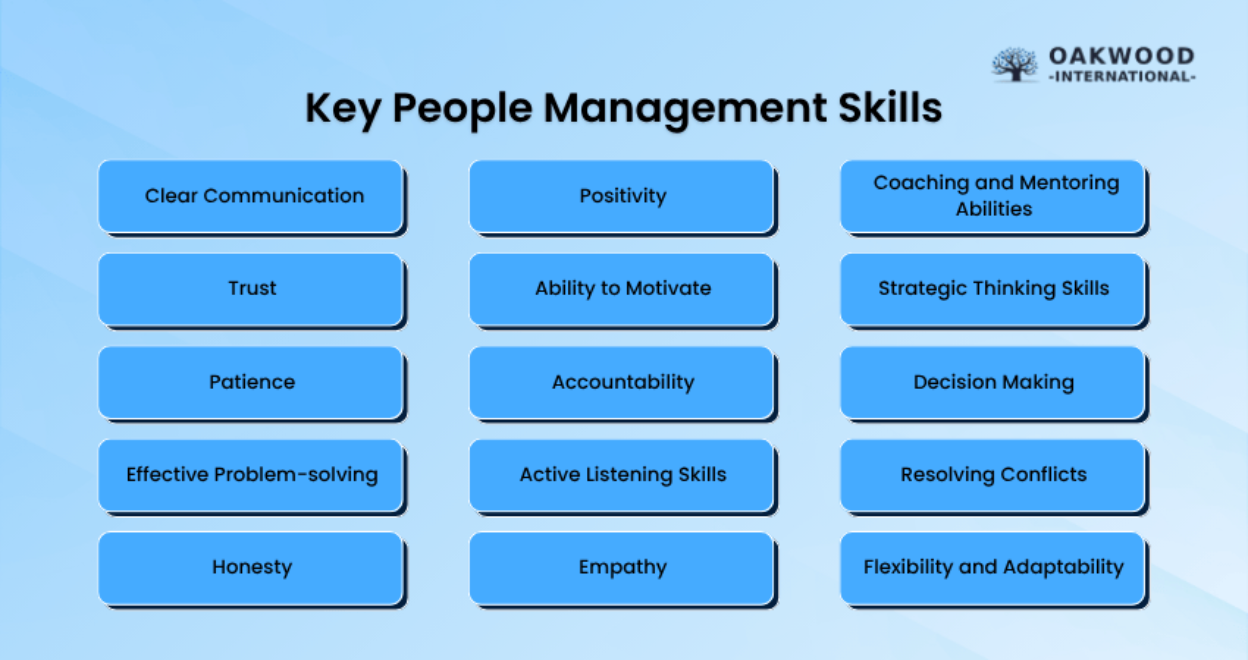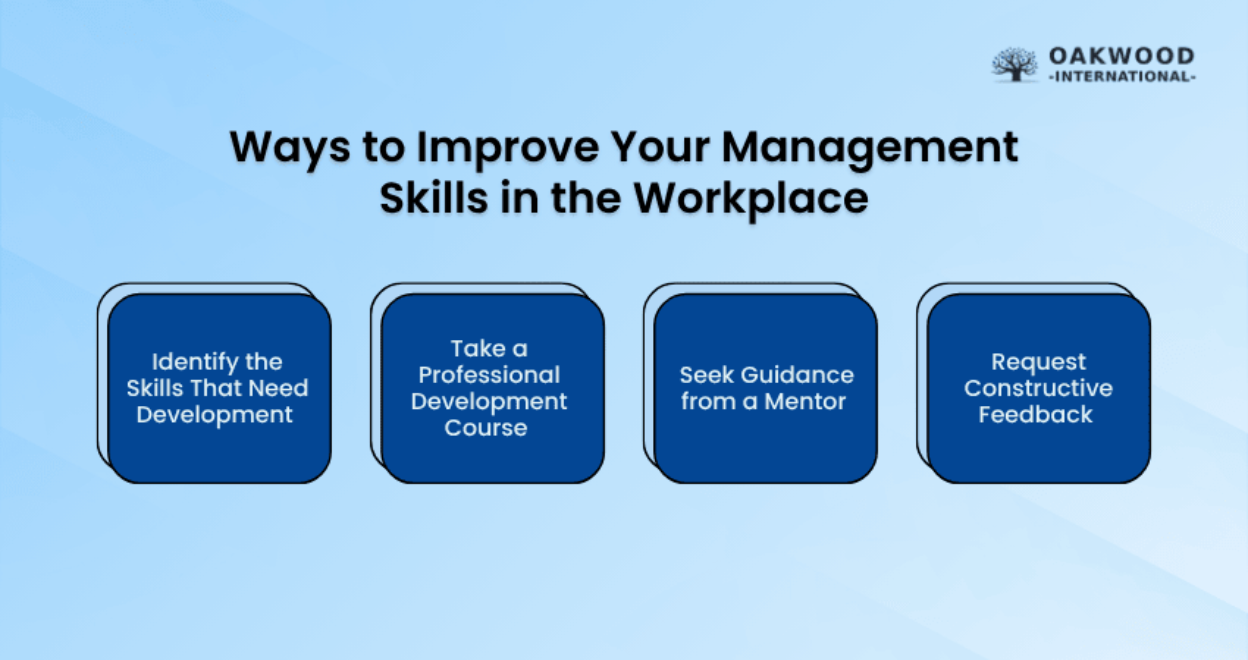Table of Contents


A manager walks in, and the energy is electric, everyone’s ready to collaborate. This isn’t luck; it’s effective People Management. A great leader motivates their team with clear communication, trust, and a deep understanding of individual strengths. These People Management Skills drive success, not just maintain operations.
In this blog, we’ll explore key People Management Skills like communication, trust, and empathy. These skills help leaders build strong, motivated teams that excel in both good times and challenges. By mastering them, leaders can turn obstacles into success.
What are People Management Skills?
People Management Skills involve guiding and motivating individuals to achieve team goals through effective communication, trust, and support. A strong leader identifies strengths, encourages growth, and fosters collaboration. This goes into ensuring that everyone feels valued.
So, at the core, it’s about resolving conflicts, maintaining morale, and inspiring productivity. Exceptional leaders balance direction with empowerment. This helps in creating an environment where team members thrive and work together seamlessly toward shared objectives.
Key People Management Skills
Effective People Management Skills are essential for building strong teams, fostering growth, and achieving organisational success. These skills enable leaders to communicate effectively, resolve conflicts, and motivate individuals toward common goals. Below are some key People Management Skills that every leader should develop:

1. Clear Communication
Clear communication helps team members understand expectations and responsibilities with ease. It reduces misconceptions and promotes a culture of openness.
Speak clearly and use body language to aid understanding
Reduce confusion to help make quick decisions
Build trust and promote open teamwork
Encourage idea-sharing in a safe environment
2. Trust
Trust is the foundation of strong relationships within teams. When trust exists, people collaborate more effectively and take more initiative.
Be honest, reliable, and consistent in your actions
Build a supportive and collaborative team environment
Help team members feel safe to express ideas
Promote accountability through mutual respect
3. Patience
Patience allows managers to guide team members through challenges and growth. It helps create a supportive learning space for everyone.
Give people time to learn and grow
Stay calm during setbacks or delays
Allow space for trial and error
Support ongoing improvement and development
4. Effective Problem-solving
Great managers solve problems without escalating them. They focus on finding solutions that keep the team moving forward.
Collaborate with others to resolve issues
Explore creative and practical solutions
Keep the team focused on common goals
Act quickly and thoughtfully when problems arise
5. Honesty
Honesty builds credibility and sets a tone of transparency. It allows for real feedback and stronger team connections.
Give honest and constructive feedback
Address issues directly and respectfully
Be clear about expectations and improvements
Foster a truthful and open environment
6. Positivity
A positive attitude can uplift the entire team and keep morale high. It also helps turn challenges into learning opportunities.
Focus on solutions rather than problems
Celebrate wins, both big and small
Encourage optimism during tough situations
Maintain a can-do spirit within the team
Get certified in HR with the CIPD Level 3 Certificate in People Practice – Start today!
7. Ability to Motivate
Motivating others is about inspiring action and keeping people engaged. A motivated team works harder and feels more connected.
Set clear, meaningful goals
Recognize and support individual contributions
Build enthusiasm through encouragement
Help the team feel a sense of purpose in their work
8. Accountability
Accountability encourages responsibility and strengthens trust. It shows that every team member plays a role in success.
Set clear expectations from the start
Lead by example in meeting commitments
Support improvement without blame
Recognize contributions and follow through
9. Active Listening Skills
Listening actively makes team members feel valued and understood. It helps identify needs, concerns, and opportunities.
Pay full attention without interrupting
Reflect and respond thoughtfully
Notice both words and body language
Create space for open conversation
10. Empathy
Empathy helps leaders connect with their teams on a human level. It builds trust and emotional safety.
Show understanding of others’ emotions
Offer support when someone is struggling
Be sensitive to personal and professional challenges
Create a caring team culture
11. Coaching and Mentoring Abilities
Great managers coach others to unlock potential. They mentor team members toward long-term growth.
Provide guidance and helpful feedback
Encourage continuous learning and skill-building
Share knowledge and personal experience
Help others set and reach goals
12. Strategic Thinking Skills
Strategic thinking helps align day-to-day work with long-term goals. It ensures everyone stays focused on what truly matters.
Plan actions with future impact in mind
Connect team efforts to bigger objectives
Balance short-term tasks with long-term vision
Anticipate challenges and plan accordingly
13. Decision Making
Strong decision-making brings clarity and direction. It helps keep projects and teams moving forward.
Evaluate options carefully and logically
Weigh risks and rewards before acting
Make timely choices when needed
Stand by your decisions with confidence
14. Resolving Conflicts
Resolving conflicts fairly keeps teams united and productive. It also prevents issues from growing.
Stay calm and listen to all perspectives
Address issues with empathy and clarity
Find win-win solutions when possible
Maintain harmony and collaboration afterward
15. Flexibility and Adaptability
Flexible leaders adapt to change with confidence. They help teams stay resilient in a fast-changing world.
Be open to new approaches and feedback
Adjust plans quickly when needed
Embrace innovation and uncertainty
Support your team through change
Boost your leadership skills and manage teams successfully with the expert-led Successful People Management and Team Leadership Course - Join now!
How to Improve Your Management Skills in the Workplace?
Improving your Management Skills is essential for both personal growth and the success of your team. Whether you’re new to management or looking to refine your approach, focusing on key areas of development can make a significant difference. Here are some strategies to help you enhance your leadership abilities in the workplace:

1. Identify the Skills That Need Development
Take a step back and assess where you’re excelling and where there’s room for improvement. Pinpoint areas such as communication, conflict resolution, or team motivation that may need extra focus. A self-assessment or a conversation with your team can give you insights into where to start your development.
2. Take a Professional Development Course
Investing in a course or workshop can help you gain specific knowledge and techniques related to management. Many leadership-focused courses, available online or in-person, help refine skills like strategic thinking, emotional intelligence, and decision-making. Continuous learning will ensure that you stay up to date with management best practices.
3. Seek Guidance from a Mentor
A mentor with more experience can provide invaluable insights and advice on how to navigate complex situations. Having someone who’s been in your shoes can help you avoid common pitfalls, guide your decision-making, and offer a broader perspective on how to lead effectively.
4. Request Constructive Feedback
Ask your team members, peers, or supervisors for honest feedback on your management style. This feedback can uncover blind spots and offer actionable ways to adjust your leadership style. Regularly seeking feedback helps you understand your strengths and areas where you can refine your approach.
Conclusion
Mastering People Management Skills is crucial for leadership and team success. By focusing on key skills like communication, trust, and empathy, leaders can create environments where teams excel, even during challenges. Developing these skills helps turn obstacles into growth opportunities, ensuring long-term success and fostering a motivated, high-performing team.
Develop high-impact Learning Strategies through the CIPD Level 7 Advanced Diploma in Strategic People Management-Start now!


 Back
Back



 Back to Catagories
Back to Catagories





 + 44 7452 122728
+ 44 7452 122728










